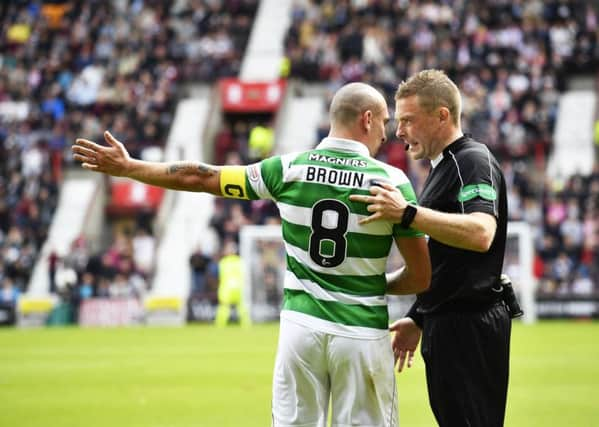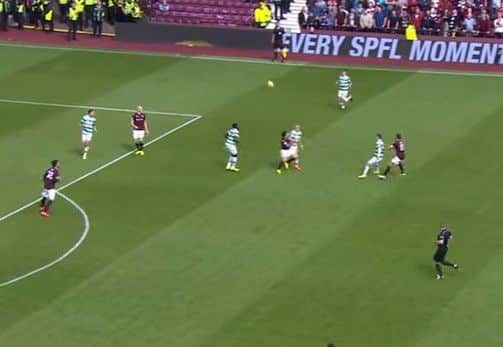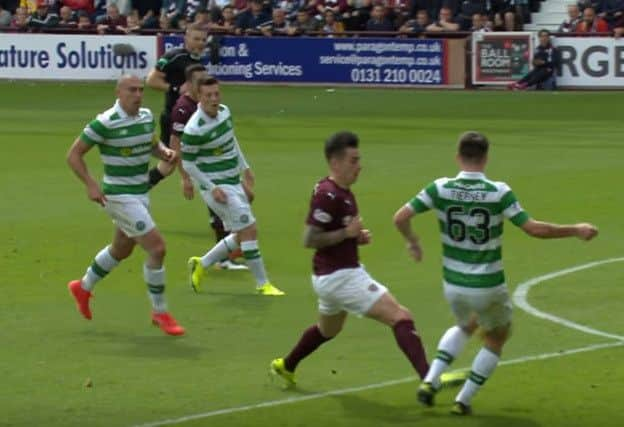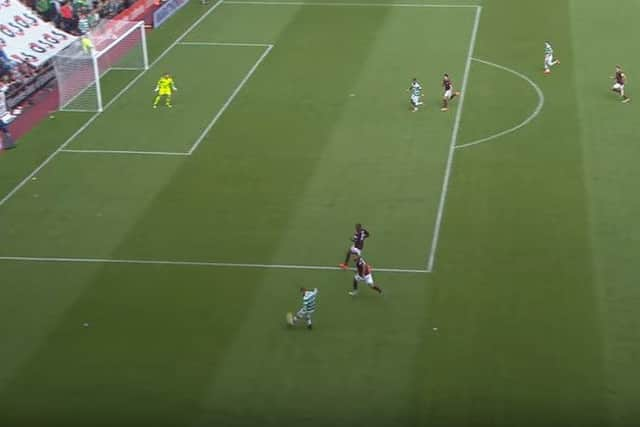Judging the referee's performance in Hearts 1 - 2 Celtic
This article contains affiliate links. We may earn a small commission on items purchased through this article, but that does not affect our editorial judgement.


Before we get to any negatives, it should be considered that John Beaton did a good job of keeping a lid on the game. Both teams were out to be very physical, but he stopped it from spilling over at any point. There were a ton of cards, which sometimes leads people to say that a ref has lost control, but such an observation is only logical when the yellow cards are not merited. Though a couple could be debated, it was difficult to disagree with any of the yellow cards shown.
Advertisement
Hide AdAdvertisement
Hide AdThe first big call of the game was the Celtic goal. To begin with, there was a challenge from Igor Rossi on Callum McGregor just inside the box. Looking at the referee, he clearly felt that there was no foul. Referees rarely play advantage from a penalty decision unless a guy is literally left with an open goal, and anyway, there did not appear to be any signal from Beaton.


The ball then breaks to James Forrest, who fires it into the net. There is absolutely no doubt that Stuart Armstrong is in an offside position, and that the goal should not have stood. The exact wording of the offside rules changes quite frequently, but this particular example is offside under pretty much any interpretation there has ever been. Based on the current rule, Armstrong was clearly guilty of “preventing an opponent from playing or being able to play the ball by clearly obstructing the opponent’s line of vision”, and the goal should not have stood.
Often, the biggest problem with these sort of decisions is that it requires both the assistant and the referee to make the decision. They both have vastly different angles on the incident and each can only make one part of the decision. The assistant is often the only one who can tell if a player is offside, and the ref is the only one who can tell whether he was obstructing the keeper’s view. Neither of these things on their own is a problem; it only becomes an issue when both occur. Even though they communicate regularly, sometimes things like this can slip through the net and neither party realises that there might be an issue with the other.
It’s doubtful whether this is what occurred yesterday. Armstrong was so far offside that there could be no way the referee could possibly think otherwise. And he is looking pretty much down the barrel of Forrest’s shot, with Armstrong directly between him and the goalkeeper. We could be generous to Beaton and say that he doesn’t think that Hamilton would have saved the ball anyway. That he didn’t think Armstrong “prevented him from being able to play (save) the ball”, but that seems unlikely. It’s a really poor decision from the referee.
An odd aspect of the goal was the reaction of the Hearts players, or lack thereof. They didn’t protest much at all. While referees don’t generally change their minds based on the reaction of players, had they complained vociferously they may have convinced Beaton to go and speak to his assistant, and it’s entirely possible that the two officials may have come to the conclusion that Armstrong was offside.


The other big call was the penalty for Hearts’ equaliser. Replays show this was never a penalty. However, Beaton may deserve more sympathy over this error. He starts off in a nice central position (shown in Image One) for a high looping ball, but the ball spins unpredictably off Scott Brown to Tony Watt. The Hearts attack quickly lays off to Jamie Walker, who is challenged by Kieran Tierney. By the time the ball gets to Walker, the ref is somewhat unsighted, and is having to lean to his left to get a view of the point of contact (as seen in Image Two). He’s is a little bit slow to react to the ball coming off Brown and doesn’t really break out of a jog until it’s too late. However, it’s worth bearing in mind that there were only around two seconds between those pictures, which is not a lot of time to react.
This poor positioning definitely contributes to the incorrect decision being made. Had he been closer he may have had a better look at how unnatural Walker’s fall was. It isn’t even a particularly convincing dive when you watch it back on close-up. However, from further away, you can see why he may have thought Tierney caught Walker on initial viewing. There are similarities between this incident and the penalty Tierney won against Astana, which was definitely was a foul. Referees study video footage of teams they’ll soon be officiating, so it’s natural to assume Beaton saw the Celtic v Astana game. The previous penalty incident may have been at the back of his mind when it came to judging this one.
There’s a chance Tierney lightly clipped the top of Walker’s foot, but the Hearts player was already on his way down by this stage, and the contact (if indeed there was any) wasn’t sufficient to merit a foul anyway.
Advertisement
Hide AdAdvertisement
Hide AdRobbie Neilson felt Hearts should have earned a second penalty late in the game when Kolo Toure challenged Robbie Muirhead, but the referee was correct to wave play on. Toure came round from the side, and swung his leg around in an attempt to play the ball, but there was little if any contact on the Muirhead before he either slipped or threw himself to the ground theatrically. It definitely looked clumsy from Toure, but there was no foul. It was clear that Muirhead was losing control of the ball by this stage, and the referee clearly felt that he was looking to buy a penalty because he had fluffed his chance of scoring.


Some Hearts supporters disputed the veracity of the winning goal, believing Scott Sinclair to have drifted into an offside position before the pass. In Image Three, if you look at the lines on the pitch, you can clearly see Sinclair is behind the play when Leigh Griffiths makes the cross.
• Craig Anderson is a former fully qualified referee. He is also the man behind SPLStats on Twitter.
DOWNLOAD THE SCOTSMAN APP ON ITUNES OR GOOGLE PLAY